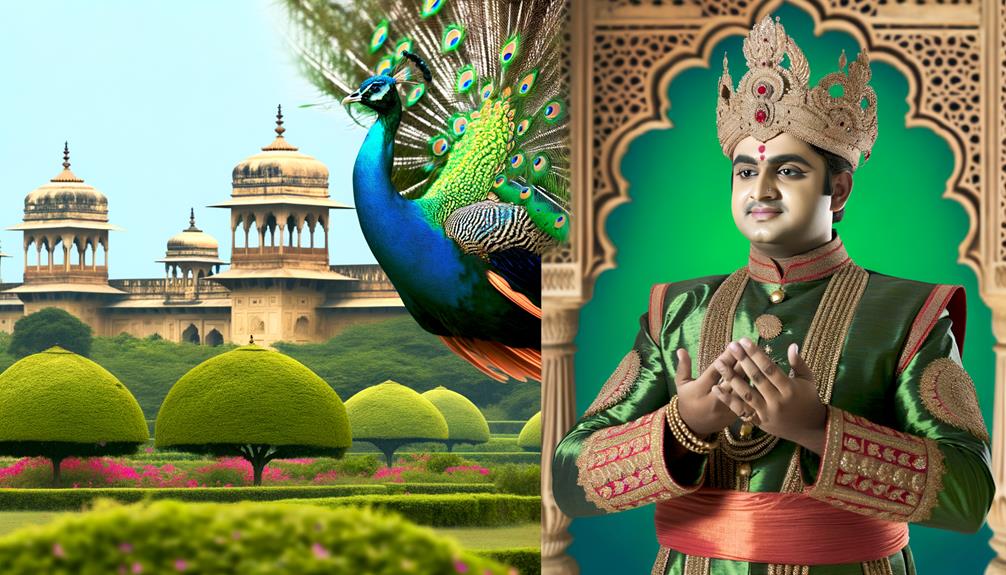Yuvraj Name Meaning in English
The name Yuvraj, derived from ancient Sanskrit, translates to 'young king' or 'young ruler' in English. It combines 'yuva' (young) and 'raja' (king/ruler), symbolizing a crown prince or heir apparent.
Deeply rooted in South Asian monarchical traditions, it represents future leadership and societal aspirations. Historically, Yuvraj has been emblematic of dynasties and is associated with respect, ambition, and responsibility.
Prominent personalities like Yuvraj Singh highlight its cultural significance and leadership qualities. In contemporary contexts, it retains its regal connotations, signifying ambition and resilience.
Further exploration reveals its enduring cultural and historical impact.

Key Takeaways
- Yuvraj translates to 'young prince' in English.
- The name originates from Sanskrit, combining 'yuva' (young) and 'raja' (king/ruler).
- Historically, it signifies a crown prince or heir apparent in South Asian monarchies.
- It symbolizes leadership, ambition, and future societal hopes.
- The name is associated with respect, honor, and distinguished qualities in Indian culture.
Origin of the Name
The name 'Yuvraj' originates from the ancient Sanskrit language. It is composed of two elements: 'yuva,' meaning young, and 'raj,' meaning king or ruler. This etymology reflects a deep cultural significance rooted in the historical context of monarchical traditions in South Asia.
In ancient times, the term 'Yuvraj' was often used to denote a crown prince, the heir apparent to a throne. This designation not only indicated the youth of the prince but also his destined role as a future ruler.
The convergence of youth and royalty in this term highlights the cultural emphasis on grooming young leaders for future governance. Such a nuanced understanding of the name underscores its rich historical and linguistic heritage.
Translation to English
The translation of the name 'Yuvraj' into English reveals its literal meaning as 'young prince,' a term imbued with regal connotations. This translation not only underscores the cultural significance of the name within South Asian societies, often symbolizing nobility and future leadership, but also reflects broader naming trends where such names are imbued with aspirational qualities.
Analyzing the popularity trends of 'Yuvraj,' it becomes evident that the name's usage has seen a notable increase, influenced by cultural icons and a growing appreciation for traditional names with profound meanings.
Literal Meaning Explained
Delving into the etymology of 'Yuvraj,' this term can be translated to English as 'Young Prince,' derived from the Sanskrit words 'yuva,' meaning young, and 'raja,' meaning king or ruler. This elucidation reveals the compound nature of the word, encapsulating both youth and sovereignty. Below is a table that highlights these essential components:
| Sanskrit Term | English Translation |
|---|---|
| Yuva | Young |
| Raja | King/Ruler |
| Yuvraj | Young Prince |
| Yuva (Root) | Youthful |
| Raja (Root) | Sovereign |
This table underscores the linguistic richness and layered meanings, fostering a deeper appreciation of the name 'Yuvraj' and its regal connotations.
Cultural Significance Overview
Understanding the cultural significance of 'Yuvraj' necessitates an exploration of its historical and societal contexts within Indian traditions and monarchies.
In Sanskrit, 'Yuvraj' translates to 'young prince' or 'heir apparent,' embodying the anticipation and responsibilities placed upon future leaders.
In ancient Indian monarchies, the Yuvraj was groomed rigorously to inherit the throne, symbolizing continuity of dynastic rule and stability. This role was not merely titular but also imbued with expectations of wisdom, valor, and governance capabilities.
The term 'Yuvraj' hence extends beyond a mere designation; it encompasses a lineage's future, societal hopes, and the preservation of cultural heritage. This understanding underscores the profound respect and honor associated with the name in Indian cultural paradigms.
Name Popularity Trends
Examining the name popularity trends for 'Yuvraj' in English-speaking countries reveals an intriguing shift, reflecting both the global diaspora's influence and the growing appreciation for multicultural names. Recently, there has been a noticeable increase in the adoption of 'Yuvraj' among diverse communities. This trend is partially driven by a broader acceptance and celebration of cultural diversity.
| Country | Year | Rank in Popularity | Change from Previous Year |
|---|---|---|---|
| United States | 2020 | 980 | +20 |
| Canada | 2020 | 1025 | +15 |
| United Kingdom | 2020 | 1150 | +10 |
| Australia | 2020 | 1180 | +8 |
These figures indicate a gradual upward movement, suggesting that 'Yuvraj' is becoming increasingly recognized and embraced in English-speaking locales.
Historical Significance
The name Yuvraj, rooted in ancient Indian tradition, carries significant historical connotations, often denoting the crown prince or heir apparent in various monarchies across the Indian subcontinent.
Historically, the title 'Yuvraj' symbolized not just royal lineage but also the preparedness for future rulership, embodying virtues such as leadership, valor, and wisdom. This title was integral in the sociopolitical fabric of dynasties, where the Yuvraj was groomed meticulously to assume the throne, reflecting the continuity of royal authority and governance.
The Yuvraj's role was pivotal in ensuring stability and succession, often participating in vital state matters alongside reigning monarchs. This historical framework underscores the name's profound legacy and its emblematic representation of future sovereigns.
Cultural Relevance
The cultural relevance of the name Yuvraj is multifaceted, encompassing its historical significance, modern usage, and regional variations.
Historically, Yuvraj denoted the crown prince, symbolizing nobility and leadership within ancient Indian monarchies.
In contemporary settings, the name persists in various regions, reflecting both traditional values and evolving societal norms, thereby illustrating its enduring legacy and adaptability.
Historical Significance
Yuvraj's historical significance is deeply rooted in the royal traditions of India, where it has denoted the title of the crown prince, signifying the heir apparent to the throne. This title was not merely honorary but carried the weight of future leadership and governance. Yuvraj was often trained rigorously in statecraft, military tactics, and diplomacy to prepare for ascension. The role also symbolized continuity and stability within the monarchy, ensuring a smooth handover of power.
| Aspect | Description |
|---|---|
| Title Significance | Denotes the crown prince, heir to the throne |
| Responsibilities | Statecraft, military training, and diplomacy preparation |
| Symbolic Importance | Represents continuity and stability within the royal lineage |
Understanding this term's historical context provides a deeper appreciation for its cultural and dynastic relevance.
Modern Usage
Frequently, the name Yuvraj is embraced in contemporary Indian society not only as a traditional moniker but also as a symbol of cultural heritage and aspirational values. This multifaceted usage underscores its relevance in various spheres, reflecting both historical continuity and modern dynamism.
The name Yuvraj, translating to 'prince,' resonates with the aspirations of parents seeking to imbue their children with qualities of leadership and nobility.
Celebrity Influence: Prominent figures like cricketer Yuvraj Singh have popularized the name.
Media Representation: Featured in films and television, enhancing its cultural footprint.
Educational Institutions: Often chosen by parents for its regal connotations, reflecting societal aspirations.
Corporate Sphere: Individuals named Yuvraj frequently occupy leadership roles, symbolizing authority and respect.
These factors collectively contribute to the enduring appeal of the name Yuvraj.
Regional Variations
Building on its modern usage, the name Yuvraj manifests distinct regional variations across India, reflecting the diverse cultural landscapes and linguistic traditions that influence naming practices.
In Northern India, particularly among Hindi-speaking communities, Yuvraj is often associated with regal connotations and is a popular choice for male children.
Conversely, in Southern Indian states such as Tamil Nadu and Karnataka, the name may be adapted to fit phonetic patterns, resulting in variations such as 'Yuvraaj' or 'Yuvrajan.'
In the eastern regions, like West Bengal, the name may be less prevalent but retains its royal significance.
These regional adaptations underscore the dynamic interplay between language, culture, and societal values in the naming conventions prevalent across various Indian communities.
Qualities and Traits
In analyzing the qualities and traits associated with the name Yuvraj, one finds a confluence of leadership, charisma, and a natural inclination towards responsibility. These elements evoke a sense of regal authority and competence, often manifesting in both personal and professional spheres.
The name Yuvraj, which translates to 'prince' in English, inherently carries connotations of nobility and valor. Individuals bearing this name are frequently observed to exhibit:
- Leadership skills: Demonstrating an inherent ability to guide and inspire others.
- Charismatic presence: Possessing a magnetic personality that attracts and influences people.
- Responsibility: Showing a strong sense of duty and reliability in various roles.
- Ambition: Driven by a desire for achievement and success.
These traits collectively underscore the distinguished nature of the name Yuvraj.
Famous Personalities
Prominent individuals named Yuvraj, such as the celebrated Indian cricketer Yuvraj Singh, exemplify the name's association with distinction and achievement. Yuvraj Singh's illustrious career in international cricket, marked by his match-winning performances and resilience, underscores the name's connotation of royalty and prowess.
Another notable figure is Yuvraj Walmiki, an Indian field hockey player whose contributions to the sport have garnered national and international recognition. These personalities reflect the qualities traditionally linked with the name Yuvraj—leadership, excellence, and an indomitable spirit.
Their accomplishments not only highlight their personal capabilities but also reinforce the cultural and historical significance of the name, which translates to 'young prince' or 'heir apparent,' signifying both potential and prominence.
Modern Usage
The name Yuvraj has maintained its relevance in contemporary society, symbolizing leadership and potential in various professional and social contexts. Its usage extends beyond traditional boundaries, reflecting a blend of cultural heritage and modern aspirations. This name is often associated with individuals who exhibit qualities of ambition, vision, and resilience.
In the corporate world, it signifies a propensity for leadership roles and strategic thinking. Yuvraj often denotes individuals in executive and managerial positions.
Socially, Yuvraj represents a balance between respect for traditions and progressive outlooks. It is common among social activists and community leaders, embodying community leadership. Additionally, the name bridges traditional values with modern ideals, serving as a cultural ambassador.
Scholars and students named Yuvraj frequently excel in their fields, exemplifying academic excellence.
Conclusion
To sum up, the name Yuvraj, translating to 'Crown Prince' in English, holds significant historical and cultural weight. This name suggests leadership, nobility, and a promising future.
For instance, Yuvraj Singh, the renowned Indian cricketer, exemplifies the qualities and traits associated with this name, such as valor, resilience, and excellence.
As a result, Yuvraj remains a name of high esteem, symbolizing both traditional values and modern aspirations.






